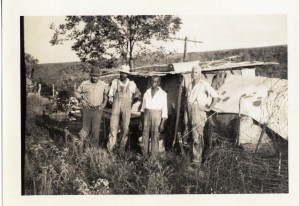Creator: Raper, Arthur Franklin, 1899-1979.
Collection number: 3966
View finding aid.
Abstract: Arthur Franklin Raper (1899-1979) was a distinguished rural sociologist, civil rights activist, and social science analyst both in the United States and in other countries. Raper’s early career focused on analysis of rural

problems and racial discrimination in the South. In 1940, he began his 22-year career as a social scientist and research analyst for several federal government agencies. After World War II, he became involved with problems of rural development on a global scale, studying conditions in Japan, Taiwan, other Asian counties, and in North Africa and the Middle East. In 1962, he went to Pakistan as senior advisor to the Pakistan Academy for Rural Development. He returned to the United States in 1964 and was a visiting professor at Michigan State University until his retirement in 1967. Papers documenting Arthur Franklin Raper’s work for the Commission on Interracial Cooperation, 1926-1939; the Southern Commission for the Study of Lynching, 1930-1931; the Carnegie-Myrdal Study of the American Negro, 1939-1940; the U.S. Department of Agriculture’s Bureau of Agricultural Economics, 1940-1952; the Foreign Operations Administration and the International Cooperation Administration, 1952-1962; and the Pakistan Academy for Rural Development, 1962-1964. Of special interest are the data on counties and towns throughout the South, compiled for the Myrdal study, and photographs by Jack Delano and Dorothea Lange documenting the rural South during the Depression. The collection contains much information about aiding and implementing postwar development programs in foreign countries, including Japan, Taiwan, other Asian countries, North Africa, and the Middle East. The papers include Raper’s correspondence and private reflections; copies of, and correspondence concerning the ten books and dozens of articles he published; extensive genealogical and biographical information; clippings; photographs; slide sets; and tapes. Also included are other photographs of the South during the Depression.
Repository: Southern Historical Collection
Collection Highlights: His papers document his participation in the Commission on Interracial Cooperation, the Myrdal study of the American Negro, and the U.S. Department of Agriculture’s Bureau of Agricultural Economics. The collection also includes correspondence and material about lynching (1925-1942), civil rights, and social justice.
Of particular interest is the data Raper collected on the Myrdal Study, and the numerous photographs that were taken by Dorothea Lange and other photographers of African Americans in Greene and Macon Counties in Georgie, as well as in the “Fourth Ward”, a poor district in Atlanta. See Series 1.3 (Photographs) for a listing and details about the photographs.
There are also slides and photographs of different African Countries such as Sierra Lione and Ethiopia, to orient individuals going to work on post-war development in various international locations. See Images Folder PF-3966/6 and 7.
Raper’s indexes to his materials and other items from this collection have been digitized. Click here to access the finding aid and link to the digitized material.

UNC’s DocSouth has digitized an oral history interview with Arthur Raper. You can listen to it online by clicking here.
The New Georgia Encyclopedia (online) includes a nice article on Arthur F. Raper.